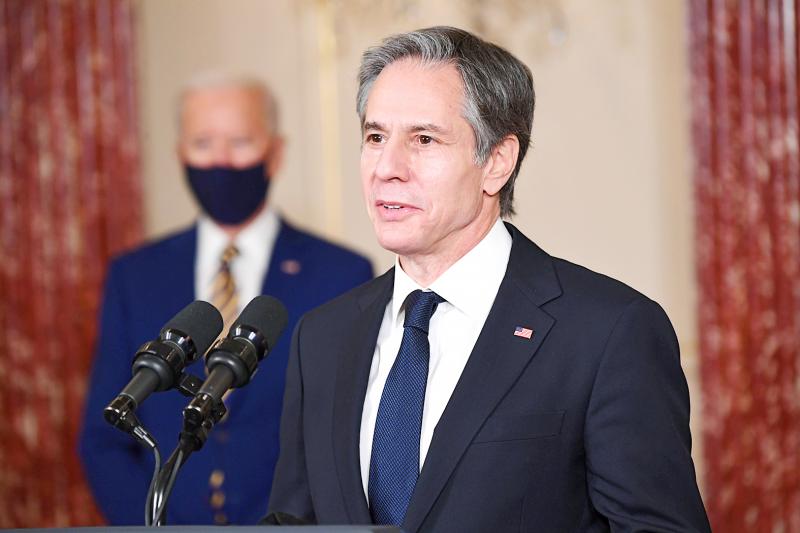US Secretary of State Antony Blinken on Friday pressed Beijing on its treatment of Uighurs, Tibetans and Hong Kong, while China defended its policies in the first conversation between top officials of the two powers since US President Joe Biden took office.
“I made clear the US will defend our national interests, stand up for our democratic values, and hold Beijing accountable for its abuses of the international system,” Blinken wrote on Twitter of his call with Yang Jiechi (楊潔篪), a politburo member and head of the Chinese Communist Party’s foreign affairs office.
Blinken told Yang that the US would “continue to stand up for human rights and democratic values, including in Xinjiang, Tibet and Hong Kong,” a US Department of State statement said of the call.

Photo: AFP
Blinken also “pressed China to join the international community in condemning the military coup” in Myanmar, it said.
The top US diplomat said the US would hold Beijing “accountable for its efforts to threaten stability in the Indo-Pacific region, including across the Taiwan Strait, and its undermining of the rules-based international system.”
The tough tone comes after Blinken in his confirmation hearing said he would continue former US president Donald Trump’s approach to China in a rare point of agreement between the two administrations.
Yang said on the call that Hong Kong, Xinjiang and Tibet were “China’s internal affairs” and “no external forces are allowed to interfere,” urging the US to “correct mistakes” made in the past few years, the Chinese embassy to the US said in a statement.
He also called on Washington to “strictly abide by the one China principle” under which Beijing considers Taiwan an inseparable part of its territory, saying that “the Taiwan issue is the most important and sensitive core issue in China-US relations.”
Blinken has previously spoken of climate change as an area of cooperation as China and the US are the two largest emitters of greenhouse gases.

The Ministry of Foreign Affairs (MOFA) yesterday said it is closely monitoring developments in Venezuela, and would continue to cooperate with democratic allies and work together for regional and global security, stability, and prosperity. The remarks came after the US on Saturday launched a series of airstrikes in Venezuela and kidnapped Venezuelan President Nicolas Maduro, who was later flown to New York along with his wife. The pair face US charges related to drug trafficking and alleged cooperation with gangs designated as terrorist organizations. Maduro has denied the allegations. The ministry said that it is closely monitoring the political and economic situation

Conflict with Taiwan could leave China with “massive economic disruption, catastrophic military losses, significant social unrest, and devastating sanctions,” a US think tank said in a report released on Monday. The German Marshall Fund released a report titled If China Attacks Taiwan: The Consequences for China of “Minor Conflict” and “Major War” Scenarios. The report details the “massive” economic, military, social and international costs to China in the event of a minor conflict or major war with Taiwan, estimating that the Chinese People’s Liberation Army (PLA) could sustain losses of more than half of its active-duty ground forces, including 100,000 troops. Understanding Chinese

UNRELENTING: China attempted cyberattacks on Taiwan’s critical infrastructure 2.63 million times per day last year, up from 1.23 million in 2023, the NSB said China’s cyberarmy has long engaged in cyberattacks against Taiwan’s critical infrastructure, employing diverse and evolving tactics, the National Security Bureau (NSB) said yesterday, adding that cyberattacks on critical energy infrastructure last year increased 10-fold compared with the previous year. The NSB yesterday released a report titled Analysis on China’s Cyber Threats to Taiwan’s Critical Infrastructure in 2025, outlining the number of cyberattacks, major tactics and hacker groups. Taiwan’s national intelligence community identified a large number of cybersecurity incidents last year, the bureau said in a statement. China’s cyberarmy last year launched an average of 2.63 million intrusion attempts per day targeting Taiwan’s critical

‘SLICING METHOD’: In the event of a blockade, the China Coast Guard would intercept Taiwanese ships while its navy would seek to deter foreign intervention China’s military drills around Taiwan this week signaled potential strategies to cut the nation off from energy supplies and foreign military assistance, a US think tank report said. The Chinese People’s Liberation Army (PLA) conducted what it called “Justice Mission 2025” exercises from Monday to Tuesday in five maritime zones and airspace around Taiwan, calling them a warning to “Taiwanese independence” forces. In a report released on Wednesday, the Institute for the Study of War said the exercises effectively simulated blocking shipping routes to major port cities, including Kaohsiung, Keelung and Hualien. Taiwan would be highly vulnerable under such a blockade, because it